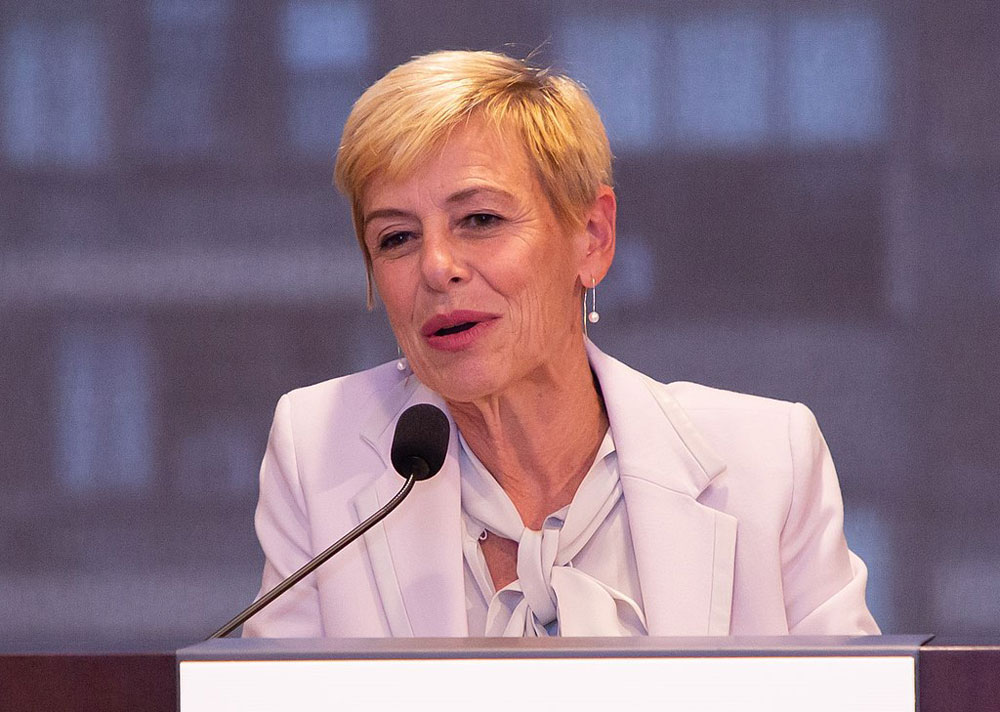
Over the last few weeks, NPQ has joined others in looking for a solid indication from philanthropy that it will act on the understanding that there is cataclysmic potential for harm and opportunity as we face a pandemic, a recession, and the potential for political transformation at the same time.
Indeed, this moment, fraught with energy, deserves a radical response, said Hilary Pennington, executive vice president for program at the Ford Foundation, in an interview yesterday. Pennington expects that the sector may come out of this period looking “very different” in many of its component parts, and so Ford and the Trust-Based Philanthropy Project decided to take a leap of leadership in proposing a “pledge of action” for changed practices in institutional philanthropy. Within 48 hours, they soon found many others to join them.
Well over 200 US and international foundations have signed the pledge thus far, which is front and center on the website of the partnering Council on Foundations. They run the gamut of types and sizes, but all agree that they will adhere for the near future to these eight shared principles of grantmaking.
- Loosen or eliminate the restrictions on current grants. This can include converting project-based grants to unrestricted support; accelerating payment schedules; and not holding grantees responsible if conferences, events, and other project deliverables must be postponed or canceled.
- Make new grants as unrestricted as possible, so nonprofit partners have maximum flexibility to respond to this crisis. We will also support organizations created and led by the communities most affected that we may not fund currently.
- Reduce what we ask of our nonprofit partners, postponing reporting requirements, site visits, and other demands on their time during this challenging period.
- Contribute to community-based emergency response funds and other efforts to address the health and economic impact on those most affected by this pandemic.
- Communicate proactively and regularly about our decision-making and response to provide helpful information while not asking more of grantee partners.
- Commit to listening to our partners and especially to those communities least heard, lifting up their voices and experiences to inform public discourse and our own decision-making so we can act on their feedback. We recognize that the best solutions to the manifold crises caused by COVID-19 are not found within foundations.
- Support, as appropriate, grantee partners advocating for important public policy changes to fight the pandemic and deliver an equitable and just emergency response for all. This may include its economic impact on workers, such as expanded paid sick leave; increasing civic participation; access to affordable health care; and expanded income and rental assistance. It should also include lending our voices to calls to action led by grantee partners, at their direction and request.
- Learn from these emergency practices and share what they teach us about effective partnership and philanthropic support, so we may consider adjusting our practices more fundamentally in the future, in more stable times, based on all we learn.
Pia Infante, steering committee chair of Trust-Based Philanthropy, emphasizes this last point:
The reason a trust-based approach works in this short-term, emergency frame is because it works for the long term. When we deeply resource our leaders, organizations, and movements, we enable the adaptivity necessary in the chaotic, complex times we are living. It may have taken a global pandemic for some philanthropies to let go of restrictions, arduous processes, and exacting expectations of already overburdened nonprofits, but let’s hope one benefit is that we now jettison all that no longer serves the greater good.
Sign up for our free newsletters
Subscribe to NPQ's newsletters to have our top stories delivered directly to your inbox.
By signing up, you agree to our privacy policy and terms of use, and to receive messages from NPQ and our partners.
Pennington hopes the effort will see signatories in the hundreds. But these principles are also only the beginning of philanthropy’s recalibration to adapt itself to the crisis Each foundation may add its own commitments; some may answer the repeat calls for increases in payout or, in the case of the Robert Sterling Clark Foundation, commit to an additional year of funding for current grantees.
Ford and Trust-Based Philanthropy, among the groups spearheading the effort, have been trying to advance the practice of combining multiyear grants with low levels of restriction. We have written about this work more generally as the “grants of nonprofits’ dreams,” and particularly about Ford Foundation’s Build program here. The combination allows nonprofits to chart their own courses freely and wisely, which is necessary during times of disaster. It also allows them to be proactive when it comes to the needs and interests of their communities, rather than their funders. Though foundations using similar practices have met over the last year to figure out how to get others to commit, until now, there has not been overwhelming interest.
As Pennington acknowledges, this pledge will be one of many steps foundations must take in the face of this pandemic and political moment. One illustration of the other efforts afoot is the new $75 million NYC COVID-19 Response & Impact Fund announced this morning for New York City nonprofits to address emerging needs and cover some expenses incurred through disruptions of operations. The Ford Foundation is also a founder of this fund, as are Bloomberg Philanthropies, Carnegie Corporation of New York, Doris Duke Charitable Foundation, Joan Ganz Cooney & Holly Peterson Fund, Kenneth C. Griffin Charitable Fund, The JPB Foundation, The Estée Lauder Companies Charitable Foundation, The Andrew W. Mellon Foundation, The New York Community Trust, Jennifer and Jonathan Allan Soros, Jon Stryker and Slobodan Randjelović, Charles H. Revson Foundation, Robin Hood, Rockefeller Brothers Fund, Laurie M. Tisch Illumination Fund, UJA-Federation of New York, and Wells Fargo Foundation. This fund will be administered by the New York Community Trust.
Finally, NPQ among others has been calling on foundations (see here and here) to proactively double or significantly increase their payout rates for the year, and we want to reiterate that here.
Additional foundations are welcome to pledge at www.cof.org/pledge.
SIGNATORIES as of March 19, 2020
- Albuquerque Community Foundation
- American Muslim Community Foundation
- Arca Foundation
- Barr Foundation
- Brandywine Health Foundation
- Brooklyn Community Foundation
- Burroughs Wellcome Fund
- Cascade Philanthropy Advisors, Inc.
- Catholic Foundation of Michigan
- Central Alabama Community Foundation
- Charles and Lynn Schusterman Family Foundation
- Coastal Community Foundation
- College Futures Foundation
- Community Foundation for San Benito County
- Community Foundation for the Alleghenies
- Community Foundation for the Greater Capital Region
- Community Foundation of East Central Illinois
- Community Foundation of Greater Dubuque
- Community Foundation of NC East
- Community Foundation of Northeast Iowa
- Communities Foundation of Oklahoma
- Community Foundation of Tompkins County
- Cricket Island Foundation
- David and Lucile Packard Foundation
- DuPage Foundation
- Durfee Foundation
- East Bay Community Foundation
- Edward W. Hazen Foundation
- Ford Foundation
- Foundation for a Healthy St. Petersburg
- Fund for Democratic Communities
- Garfield Foundation
- Gaylord and Dorothy Donnelley Foundation
- General Service Foundation
- GlobalGiving Foundation
- Global Fund for Children
- Gulf Coast Community Foundation
- Headwaters Foundation
- Healthy Americas Foundation
- Heinz Endowments
- Hill-Snowdon Foundation
- Homer and Mildred Scott Foundation
- Howard Gilman Foundation
- International Women’s Health Coalition
- James Graham Brown Foundation
- Jewish Women’s Foundation of the Greater Palm Beaches
- Johnson Family Foundation
- Joseph LeRoy and Ann C. Warner Fund
- JPB Foundation
- Kalamazoo Community Foundation
- Knox County Foundation
- Korean American Community Foundation
- Lancaster County Community Foundation
- Lawrence Welk Family Foundation
- League of California Community Foundations
- Levi Strauss Foundation
- Lumina Foundation
- Main Street Community Foundation
- Merck Family Fund
- Meyer Memorial Trust
- Middletown Community Foundation
- Moore Philanthropy
- Moses Taylor Foundation
- Native American Agriculture Fund
- New York Foundation
- North Georgia Community Foundation
- Northwest Area Foundation
- Northwest Connecticut Community Foundation
- Oak Foundation
- Outer Banks Community Foundation
- Overdeck Family Foundation
- Panta Rhea Foundation
- Parkersburg Area Community Foundation
- Peace Development Fund
- Philanthropy Delaware
- Pikes Peak Community Foundation
- PRBB Foundation
- Propel Capital
- Robert Sterling Clark Foundation
- Rocky Mountain Health Foundation
- Rosenberg Foundation
- Robert R. McCormick Foundation
- Rockefeller Brothers Fund
- Sagner Family Foundation
- Satterberg Foundation
- Seattle Foundation
- Skillman Foundation
- Solidaire Network
- Stupski Foundation
- Surdna Foundation
- The California Endowment
- The Community Foundation for Northeast Florida
- The Denver Foundation
- The Evanston Community Foundation
- The George Gund Foundation
- The Grove Foundation
- The Joyce Foundation
- The Libra Foundation
- The Luzerne Foundation
- The Palette Fund
- The Sawyers Family Fund
- The Tecovas Foundation
- The Whitman Institute
- Tulsa Community Foundation
- Weissberg Foundation
- William and Flora Hewlett Foundation
- WNC Bridge Foundation
- Woodward Hines Education Foundation











